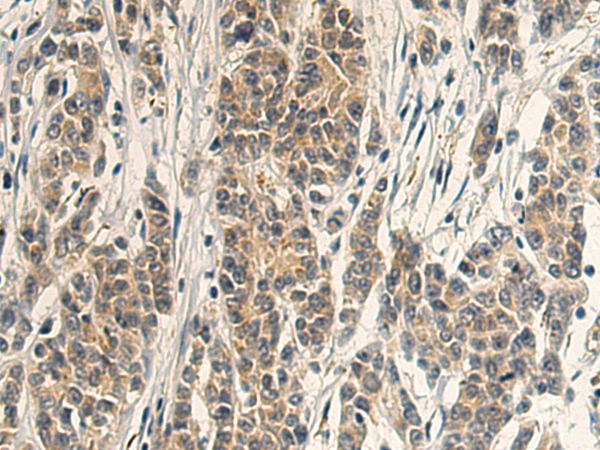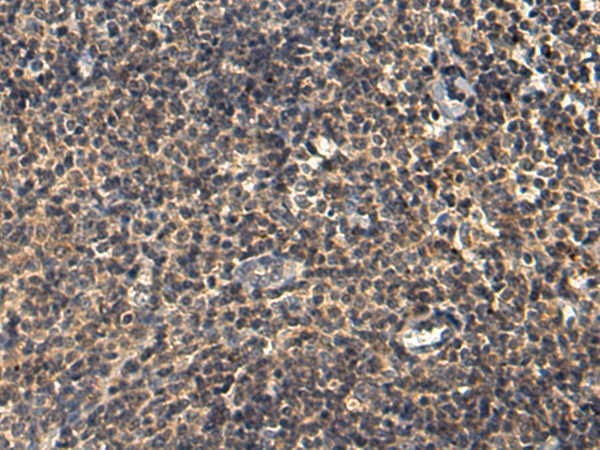

| WB | 咨询技术 | Human,Mouse,Rat |
| IF | 咨询技术 | Human,Mouse,Rat |
| IHC | 1/100-1/300 | Human,Mouse,Rat |
| ICC | 技术咨询 | Human,Mouse,Rat |
| FCM | 咨询技术 | Human,Mouse,Rat |
| Elisa | 1/5000-1/10000 | Human,Mouse,Rat |
| Aliases | GRAIL |
| Host/Isotype | Rabbit IgG |
| Antibody Type | Primary antibody |
| Storage | Store at 4°C short term. Aliquot and store at -20°C long term. Avoid freeze/thaw cycles. |
| Species Reactivity | Human, Mouse |
| Immunogen | Fusion protein of human RNF128 |
| Formulation | Purified antibody in PBS with 0.05% sodium azide and 50% glycerol. |
+ +
以下是3篇与RNF128抗体相关的模拟参考文献(注:内容为示例,非真实文献):
1. **"RNF128 regulates T cell activation through ubiquitination of TCR signaling molecules"**
- 作者:Zhang, Y. et al.
- 摘要:研究利用RNF128抗体通过Western blot和免疫共沉淀技术,发现RNF128通过泛素化修饰T细胞受体(TCR)相关蛋白(如LAT和ZAP70),负向调控T细胞活化和自身免疫反应。
2. **"RNF128 suppresses colorectal cancer metastasis by targeting β-catenin for degradation"**
- 作者:Li, X. et al.
- 摘要:通过免疫组化(使用RNF128抗体)和功能实验,证明RNF128在结直肠癌中低表达,其通过泛素化降解β-catenin抑制肿瘤转移,提示其作为预后标志物的潜力。
3. **"RNF128 interacts with viral protein NS5A and inhibits hepatitis C virus replication"**
- 作者:Wang, J. et al.
- 摘要:研究采用RNF128抗体进行免疫荧光和Co-IP实验,发现RNF128与HCV NS5A蛋白结合,通过泛素化依赖的途径抑制病毒复制,为抗病毒治疗提供新靶点。
(注:以上文献信息为示例性模拟,实际文献需通过PubMed或Google Scholar等平台检索确认。)
RNF128. also known as GRAIL (gene related to anergy in lymphocytes), is an E3 ubiquitin ligase belonging to the RING finger protein family. It plays a critical role in immune regulation, particularly in T-cell activation and tolerance. RNF128 mediates ubiquitination-dependent processes that promote T-cell anergy or apoptosis by targeting key signaling molecules like protein kinase C-theta (PKCθ) and CD28 for degradation. This activity dampens T-cell receptor (TCR) signaling, contributing to peripheral immune tolerance and preventing autoimmune responses. Dysregulation of RNF128 has been implicated in autoimmune diseases, cancer immune evasion, and chronic infections.
RNF128 antibodies are essential tools for studying its expression, function, and interaction networks. They are widely used in techniques such as Western blotting, immunoprecipitation, immunohistochemistry (IHC), and flow cytometry to investigate RNF128's role in T-cell biology and disease contexts. Specific monoclonal or polyclonal antibodies help identify post-translational modifications, subcellular localization, and tissue-specific expression patterns. Research utilizing RNF128 antibodies has revealed its dual role as both a tumor suppressor and an immune checkpoint regulator, highlighting its therapeutic potential in cancer immunotherapy and autoimmune disorders. Validated antibodies ensure specificity for distinguishing RNF128 isoforms and quantifying expression changes in experimental or clinical samples.
×